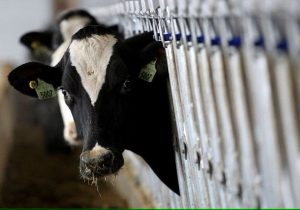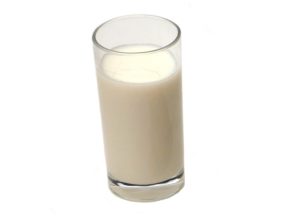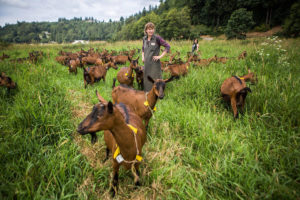In 2016, Kisaan – which means ‘farmer’ in Punjabi – started making Indian-style cheese before moving on to unhomogenised milk.
Owners Jaspreet Singh and Surinder Singh (not related) met in Melbourne after arriving in Australia in 2006 and drove taxis and trucks before starting a dairy processor.
“When I moved to Shepparton I knew it was a hub for dairy farms and there’s a lot of milk around,” Jaspreet said.
“We also knew there was a big Indian community growing in Melbourne and we thought we could start making fresh products with an authentic taste.”
Kisaan’s most popular product is pasteurised unhomogenised milk with the cream still on the top, which Jaspreet and Surinder say tastes like what they grew up with.
“Culturally, dairy is a very significant part of an Indian diet and the authentic taste is missing here in cheese and yoghurt,” Surinder said.
“The milk is popular because it is unhomogenised and elderly people like it as well because they used to get it here in Australia decades ago.”
Lockdown boom
In the beginning, Kisaan mostly filled commercial orders to Indian sweet producers, but in 2020 they stumbled upon a new market when Melbourne went into lockdown.
“There was one day when I had about 1,000 litres in the van on the way to Melbourne and I was hearing on the news that the state of Victoria was going into lockdown,” Jaspreet said.
“All the customers were shutting their doors and they didn’t want the milk.
“So I rang one of my friends who lives in Craigieburn and said, ‘I’ll give you some milk to make recipes with’.
“Then his neighbour came out and wanted some too, so we drove around the neighbourhood and gave the milk to people.
Surinder said demand for home deliveries then began to run “out of control”.
“I was always on the phone and my family were upset,” he said.
“But I was loving it because we were getting so many orders.”
Now the company delivers about 300 orders a day, six days a week to a mix of home and commercial customers and processes about 15,000 litres of milk every second day.
Paying by the litre
As a new processor in an established dairy region, it took a while for Kisaan to find farmers who would supply them milk.
“There was a time when farmers were reluctant to supply us because they were locked into contracts with major processors,” Jaspreet said.
“Around the time we started, the ACCC ruled out processors locking in suppliers and so it really helped us.”
Jaspreet said the company bought its milk from three “very good local farmers”.
“They have been supporting us since the beginning,” he said.
Jaspreet said milk pricing was a major issue for them in the beginning, but they decided to offer more than the bigger players.
“Major processors pay per kilo fat-protein content, but we pay by the litre, which is about 21 per cent more than the major processors,” he said.
Roaming into new territory
The next product the company hopes to get on shelves is buffalo milk.
“In three years we have achieved a lot and we want to make more products,” Jaspreet said.
“There is a market for buffalo milk here in Australia and we are in contact with the suppliers already.”
Jaspreet said there were only three farms in Victoria supplying buffalo milk, but he was confident he could sell it.
“In India, most people drink buffalo milk because it’s high in fat and protein content,” he said.








